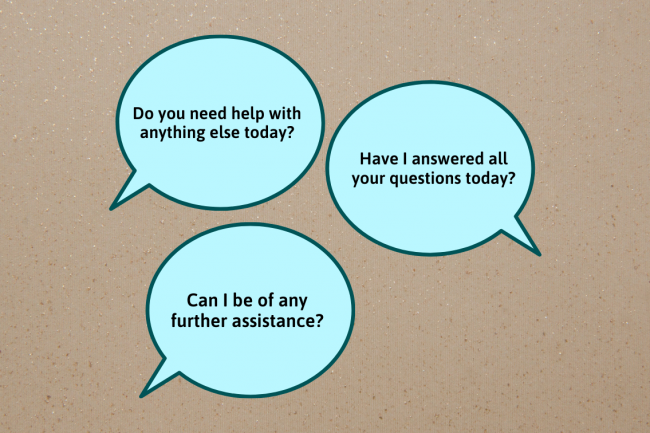Ending a phone conversation isn’t always easy, especially if you’re on the line with a talkative person or someone who tends to ramble on. You don’t want to end the conversation abruptly and come across as rude, but you don’t want to get trapped in a never-ending call when you have other things to do. After all, knowing how to end a conversation gracefully adds up to your overall conversation skills.
In this article, you’ll learn how to end a phone call politely. Most of these tips apply to both personal and business calls, and they also work for video calls.
Sections
How to end a phone call
If you aren’t sure how to get someone off the phone when you want to wind down the conversation, try these strategies. You may need to try a couple of these techniques; some people are socially skilled and will quickly get the hint, whereas others only respond to a more direct approach.
1. Remind the other person of the time
If you’ve been talking to someone for a while, try drawing their attention to the time. Most people will take the hint and realize that you want to bring the call to an end.
Here are some ways you could call attention to the time:
- Wow, we’ve been chatting for half an hour!
- I just noticed that we’ve been talking for 45 minutes!
- It’s nearly five o’clock already! I don’t know where the time’s gone.

2. Summarize the points of the call
Try to refocus the conversation back to the main topic and sum up the points you’ve covered. The other person will usually understand that you want to wrap up the call. Summarize the most important things they’ve told you, and end on a positive note before saying goodbye.
For example:
You: “It’s been wonderful to hear about your wedding plans, and it’s so exciting that you’re getting a puppy, too.”
Your friend: “I know, it’s a crazy year! It was great to speak to you.”
You: “I’ll look forward to getting my invite! Bye.”
3. Give a believable excuse for ending the call
If you’re talking to someone who doesn’t respond to subtle social cues, you may need to take a blunter approach and use an excuse. Remember that good excuses are simple and believable.
For example, you could say, “Got to go, I’ve got a mountain of work to do!,” “I’d love to talk longer, but I really need to start preparing my dinner,” or “I’m up early tomorrow, so I need an early night. I’ll talk to you properly later!”
4. Set up a future call to discuss any further points
If it’s clear that you and the other person won’t be able to cover everything in a single call, arrange another time to talk. This approach makes it clear that you don’t intend to talk about anything else and that the current conversation is coming to an end.
Here are two examples of how you can end a call gracefully by setting up another time to talk:
- “This has been so helpful, but I know there’s more to discuss about the conference arrangements. Let’s set up another call to wrap up the last couple of points. Are you free next Tuesday afternoon?”
- “I have to go soon, but I really want to hear more about your house move. Could we talk on the weekend, say, on Saturday morning?”
5. Ask for an email or in-person meeting
Some topics are best handled over email or face-to-face rather than on the phone. You might save yourself a long or confusing phone call by suggesting another way to communicate.
For example, suppose you are talking with a friend about your upcoming road trip that involves several hotel or hostel stays, and you need to discuss your itinerary. You sense that it’s going to take a long time to check all the details over the phone, and your friend has started to overload you with details.
You could say, “Would you mind emailing me a copy of the schedule and hotel reservations via email for me to double-check? I think it will take a long time for us to go over everything on the phone.”
If you’re trying to discuss a complicated or sensitive issue, it may be better to talk about it in person. You could say, “I think this conversation would be better face-to-face. Could we talk about this over coffee soon?”
6. Thank the other person for calling
“Thank you for calling” is an easy way to start winding down a phone conversation, especially a professional call. It’s common for call center workers and customer service representatives to use it as part of their closing spiel.
For example:
Them: “OK, that answers my questions. Thanks for all your help.”
You: “I’m glad I could assist you. Thank you for calling our customer service department today. Goodbye!”
But this technique isn’t just for professional environments; you can adapt it for almost any situation.
For example, if you’re talking to someone you have a close personal relationship with, you can make a “Thank you” cute or funny instead of formal. If you’re on the phone with your boyfriend or girlfriend, you could say, “OK, I’ll stop going on now. Thank you for always listening to my ramblings. You’re the best! See you in a while. Love you.”
7. Ask the caller whether they need further help
If you work in a customer service role, asking a caller whether they need any more help is often an effective way to end a long phone call with a customer professionally without being rude.

If they say “No,” you can then thank them for calling and say goodbye.
8. Give a 5-minute warning
Setting a 5-minute time limit may encourage the other person to bring up any crucial points and makes it clear that you can’t stay on the line much longer.
Here are some ways to introduce a time limit:
- “Just a heads up: I can only talk for 5 more minutes, but I hope I can answer your question.”
- “I’m sorry that I don’t have more time, but I’ve got to go in 5 minutes. Is there anything else we can cover quickly?”
- “Oh, by the way, I’ve got to go out in 5 minutes.”
9. Provide your contact details so they can follow up
Some people continue a conversation because they are worried about missing an important point. They might have a feeling that they’ll soon remember something and don’t want to miss a chance to tell you about it.
It can help to reassure the other person that they can get in touch if they have any other problems. They might then feel more comfortable about ending the call because they know they’ll have another chance to ask any questions.
Here’s how you can make sure someone has your contact details and reassure them that they can follow up with you:
- “I’m so glad I could help you today. If you think of any other questions, send me an email. Do you have my address?”
- “I’ve got to go now, but you can call me if you need to talk about anything else. Do you have my number?”
10. Make plans to talk again soon
Making plans to catch up again soon with someone is a friendly, positive way to end a phone call. For example, you could say, “It was nice talking to you after all this time! We should do this more often. I’ll call you in the New Year.”
11. Wait for a lull in the conversation
Some people are more talkative than others, but even in fast-paced conversations, there are usually a few silences or pauses. A break in conversation is a perfect opportunity to start closing the call smoothly.
For example:
You: “So yeah, that’s why I’ll be really busy this summer.”
Them: “Oh, OK! Sounds fun.” [Small pause]
You: “I’ve got to tidy up my apartment. I think my friend’s coming over soon. It’s been great to catch up with you.”
Them: “Yes, it has! OK, have fun. Bye.”
12. Know when it’s time to interrupt
If you’ve tried to close the call a couple of times, but the other person just carries on talking, you may need to interrupt them.
It’s possible to interrupt without being awkward; the secret is to keep your tone friendly and to sound slightly apologetic.
Here are some ways you can interrupt someone so you can bring the call to a close:
- “I’m so sorry to interrupt, but I’ve only got a few minutes before I’m due to take another call. Is there anything else you need me to pass on to the manager today?”
- “I don’t want to shut you down, but I really must head out to the grocery store before it closes.”
- “I apologize for interrupting, but I need to bring this interview to a close now because we’ve gone over our allotted time.”
Common questions
Who should end a phone call?
Either person can end a phone call. There is no universal rule because each situation is different. For example, one person may have to deal with an unexpected interruption that means they have to end the conversation or they may feel too tired for a long call.
If you make a lot of conversations over text, you might also like our article on how to end a text conversation.












